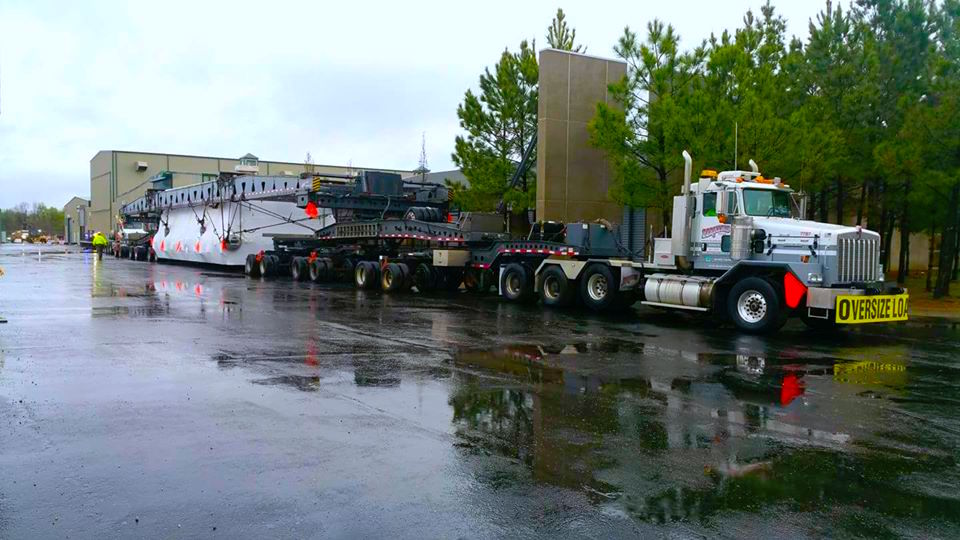Perkins was contracted to move three (3) large industrial boilers each weighing 258,000 pounds in early spring. A feasibility and operational study (FOS) was completed to make sure the three pieces could be routed and permitted properly from Oklahoma to New York. The states along this route have very specific requirements that must be met in order to comply with all state, city, and county regulations. Not to mention, the three boilers were each 19' 6" wide, providing another challenge in finding a route that could handle the oversize weight, in addition to the extreme width.
Although we have successfully transported many boilers of this size, the variables change often and in great detail. What we have accomplished once can not always be accomplished again the exact same way because of new programs, new personnel, or a new policy. Once it was established that our 125 ton dual lane suspension beam combination for the 1,500+ mile haul through 8 states was the best fit for the job and planning was well underway, field execution could commence.
As crazy as it sounds, sometimes it is easier to cross the international border into Canada, than it is to cross over a state line within the United States with an oversize load. Each state has their own policies on how to best maintain and control their roads and bridges. The hand off requires a lot of planning and communication for it to go smoothly. Frankly, when patrol escorts are used to seeing a farm combine on a low-boy and they show up seeing a million pound load taking up the entire road it's not an easy tag-team to just toss radios from one patrol to the next and carry on.
Photo by: MO Chamber of Commerce
The goal is minimum down time, as we are all on somebody else's clock. We pride ourselves on our planning and state borders are just one of many reasons why. In this circumstance, we had a designated parking spot (more like a pull over location), per the patrol of the entering state. Luckily, the exiting state agreed to this location, as that can be an issue if there are no locations close enough to the border for the transition to take place. Once parked, the entering state required a full inspection, DOT audit, and safety coordination meeting. Had we not been prepared this could have taken a full morning, but our pre-trips, permits, eLogs, and tasks were in hand and prepared in advance. In this situation, the entering state trooper would not accept our Operator's electronic logs via his handheld device. eLogs will be federally mandatory by the end of the year, but instead he required screenshots for the past 7 days to be emailed to him directly, so he could pull it up on his own device. Some companies use devices installed in the tractors themselves so the trooper may have difficulties getting into the cab to view logs, but our logs are connected to any smartphone, tablet, or cellular data capturing device that are extremely mobile for these purposes. Additional and redundant steps during border crossings only extend the overall time it takes for us to get moving again.
Once the inspection and audit were complete, we had a safety coordination meeting, which we always do prior to departing. We discuss the tasks ahead of us for the duration of the trip, as well as all the safety protocols that must be followed whether it is radio communication or anyone's right to stop all operations due to a potentially hazardous situation, no questions asked. Earlier that day we learned that our route into the upcoming state was changed due to construction. Fortunately, we have mobile office capabilities which provide us the ability to adapt to any changes in a real-time capacity and all were made aware of the tasks necessary to be prepared for the next state border. All in all, the time it took to get moving was about an hour, and we were safely headed towards our designation prepared for our next leg.
Again, it's important to recognize that without proper planning, communication, and safety protocols, this could be wasted time and money for all persons involved, but Perkins is committed to its customers, crews, and general public. We will continue to do all in our power to reduce risk for all parties, that's our value to you.




